#irish rebellion 1916
Explore tagged Tumblr posts
Text
Those Executed For Involvement In the Irish Easter Rising in 1916
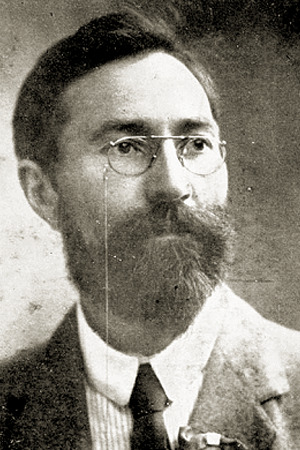
Francis Sheehy-Skeffington (died age 37)
Sheehy-Skeffington tried to organise a citizen police force to stop looting on the Tuesday of the Rising. Heading home, he was arrested in for no reason by British troops. Capt JC Bowen-Colthurst used him as a hostage while attacking the shop of Alderman James Kelly, at the top of Camden Street. Bowen-Colthurst destroyed the shop with grenades, and shot dead a 17-year-old boy before marching Sheehy-Skeffington and two journalists to Portobello Barracks. The next morning, they unaware they were going to be shot to death until moments before it occurred. They were executed the next morning on April 26th, 1916. Those involved attempted to cover up what they did.

Thomas “Tom” Clarke (died age 58)
Clarke was stationed at headquarters in the General Post Office during the Easter Week. Clarke wrote on the wall of the house after surrender on April 29th, "We had to evacuate the GPO. The boys put up a grand fight, and that fight will save the soul of Ireland." He was arrested after the surrender. He and other rebels were taken to the Rotunda where he was stripped of his clothing in front of the other prisoners. He was later held in Kilmainham Gaol. He was court-martialled and sentenced to death. Before his execution, he asked his wife Kathleen to give this message to the Irish People:
"My comrades and I believe we have struck the first successful blow for freedom, and so sure as we are going out this morning so sure will freedom come as a direct result of our action . . . In this belief, we die happy."
He was then executed by firing squad on May 3rd, 1916.
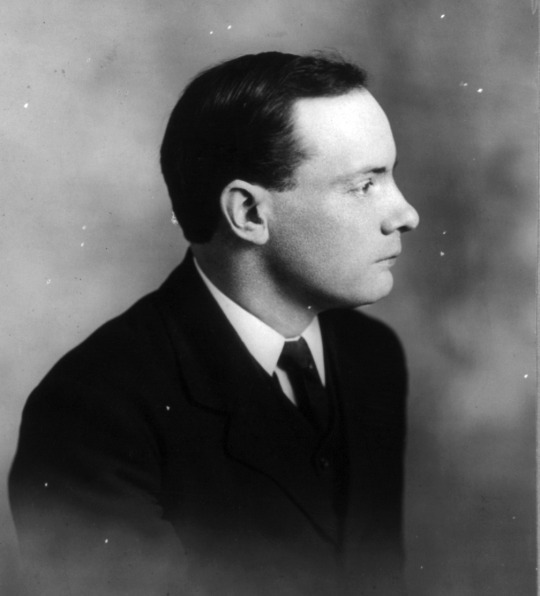
Patrick Pearse (died age 36)
Easter Monday, April 24th 1916, it was Pearse who read the Proclamation of the Irish Republic from outside the General Post Office, the headquarters of the Rising. Pearse was the person most responsible for drafting the Proclamation, and he was chosen as President of the Republic. Six days after he issued the order to surrender. He was court-martialled and executed by firing squad on may 3rd, 1916. He was said to be whistling as he came out of his cell to be killed. The day before his death he wrote:
"When I was a child of ten I went down on my bare knees by my bedside one night and promised God that I should devote my life to an effort to free my country. I have kept that promise. As a boy and as a man I have worked for Irish freedom. The time, as it seemed to me, did come, and we went into the fight. I am glad we did. We seem to have lost. We have not lost. To refuse to fight would have been to lose, to fight is to win. We have kept faith with the past and handed on a tradition to the future."

Thomas MacDonagh (died age 37)
MacDonagh's battalion was stationed at Jacob's Biscuit Factory. Despite MacDonagh's rank and the fact that he commanded one of the strongest battalions, they saw little fighting. MacDonagh received the order to surrender on April 30th, though his battalion was prepared to continue. Following the surrender, MacDonagh was court martialled, and executed by firing squad on May 3rd, 1916. In his last message to the Irish people he wrote:
"I, Thomas MacDonagh, having now heard the sentence of the Court Martial held on me today, declare that in all my acts, all the acts for which I have been arraigned. I have been actuated by one motive only, the love of my country, and the desire to make her a sovereign, independent state."

Joseph Mary Plunkett (died age 28)
Following the surrender Plunkett was held in Kilmainham Gaol, and faced court martial. Seven hours before his execution, he was married in the prison chapel to his sweetheart Grace Gifford, a Protestant convert to Catholicism, whose sister, Muriel, had years before also converted and married his best friend Thomas MacDonagh, who was also executed for his role in the Easter Rising. Grace never married again after his death on May 4th, 1816. Days before his sentence Plunkett had written in a letter to Grace:
"Listen--if I live it might be possible to get the Church to marry us by proxy- there is such a thing but it is very difficult I am told. Father Sherwin might be able to do it. You know how I love you. That is all I have time to say. I know you love me and I am very happy."

Edward “Ned” Daly (died age 25)
Daly's battalion, stationed in the Four Courts and areas to the west and north of the centre of Dublin, saw the most harsh fighting of the rising. He was forced to surrender his battalion on April 29th by Patrick Pearse. He was executed by firing squad on May 4th 1916. Men in his battalion spoke of him as a good leader.

Michael O’Hanrahan (died age 38)
O’Hanrahan was second in command of Dublin's 2nd battalion under Commandant Thomas MacDonagh. He fought at Jacob's Biscuit Factory, though the battalion saw little action other than intense sniping throughout Easter week. O'Hanrahan was executed by firing squad on May 4th 1916 at Kilmainham Jail. His brother, Henry O'Hanrahan, was sentenced to penal servitude for life for his role in the Easter Rising.

William “Willie” Pearse (died age 34)
Willie followed his brother into the Irish Volunteers and the Republican movement. He took part in the Easter Rising in 1916, always staying by his brother's side at the General Post Office. Following the surrender he was court-martialled and sentenced to be executed. It has been said that as he was only a minor player in the struggle it was his surname that condemned him. However, at his court martial he rather exaggerating his involvement. On May 3rd, William was granted permission to visit his brother in Kilmainham Gaol and to see him for the final time. While Willie was en route, Patrick was executed first and they never saw one another again. Willie was executed on May 4th, 1916.

John MacBride (died age 47)
In 1905 MacBride joined other Irish nationalists in preparing for an insurrection. Because he was so well known to the British, the leaders thought it wise to keep him outside their secret military group planning a Rising. He was in Dublin early on Easter Monday morning to meet his brother Dr. Anthony MacBride, who was arriving from Westport to be married on the Wednesday. The Major walked up Grafton St and saw Thomas MacDonagh in uniform and leading his troops. He offered his services and was appointed second-in-command at the Jacob's factory. After the Rising, MacBride, following a court martial under the Defence of the Realm Act, was shot by British troops in Kilmainham Gaol, Dublin.
He was executed on May 5th 1916, two days before his forty-eighth birthday. Facing the British firing squad, he said he did not wish to be blindfolded, saying:
"I have looked down the muzzles of too many guns in the South African war to fear death and now please carry out your sentence."
He is buried in the cemetery at Arbour Hill Prison in Dublin.
Executed two days before his 54th birthday on May 5th.
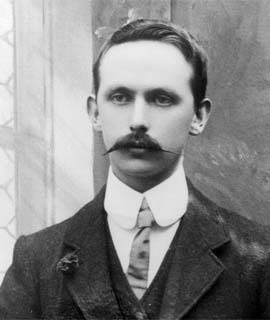
Éamonn Ceannt (died age 34)
After the unconditional surrender of the 1916 fighters, Eamonn Ceannt was detained. While Ceannt was being picked for trial, volunteer James Couhlan remembers him being determined in looking after the welfare of “the humblest of those who had served under him”. Ceannt was tried under court martial as demanded by General Maxwell. May 2nd, Ceannt was sent to Kilmainham Gaol to face trial and execution.
Written a few hours before his execution from cell 88 in Kilmainham Gaol, he wrote:
“I leave for the guidance of other Irish Revolutionaries who may tread the path which I have trod this advice, never to treat with the enemy, never to surrender at his mercy, but to fight to a finish...Ireland has shown she is a nation. This generation can claim to have raised sons as brave as any that went before. And in the years to come Ireland will honour those who risked all for her honour at Easter 1916.”
Ceannt was held in Kilmainham Gaol until his execution by firing squad on May 8th 1916. He is buried at Arbour Hill.

Michael Mallin (died age 41)
When Connolly was inducted into the Irish Republican Brotherhood in January 1916. On Easter Monday Mallin departed from Liberty Hall at 11:30am to take up his post at St Stephen's Green with his small force of ICA men and women. Upon arriving at the park they evacuated it, dug trenches, erected kitchen and first aid stations, and constructed barricades in the surrounding streets. Mallin planned to occupy the Shelbourne Hotel, located on the north-east side of the park, but insufficient troops prevented him from doing so. The next morning under intense machine gun fire Mallin ordered his troops to retreat to the Royal College of Surgeons on the west side of the park. The garrison remained in the barricaded building for the remainder of the week.
Mallin surrendered on April 30th 1916. The garrison was taken first to Dublin Castle then to Richmond Barracks, where Mallin was separated for court-martial. At his court-martial he downplayed his involvement. In his statement, Mallin stated:
“I had no commission whatever in the Citizen Army. I was never taken into the confidence of James Connolly. I was under the impression that we were going out for manoeuvres on Sunday . . . Shortly after my arrival at St Stephen's Green the firing started and Countess Markievicz ordered me to take command of the men as I had been so long associated with them. I felt I could not leave them and from that time I joined the rebellion."
Mallin was found guilty and transported to Kilmainham Gaol for his execution. He was executed May 8th 1916. The night before his execution he was visited in his cell by his mother, three of his siblings, his pregnant wife and their four children. In his last letter to his wife, who was pregnant with their fifth child, Mallin said:
"I find no fault with the soldiers or the police [I ask you] to pray for all the souls who fell in this fight, Irish and English . . . so must Irishmen pay for trying to make Ireland a free nation."
He wrote to his children:
“Una my little one be a Nun Joseph my little man be a Priest if you can James & John to you the care of your mother make yourselves good strong men for her sake and remember Ireland”
His funeral mass took place at the Dominican Church in Tallaght on May 13th, 1917. People from the procession clashed with police outside the church with two policemen injured.
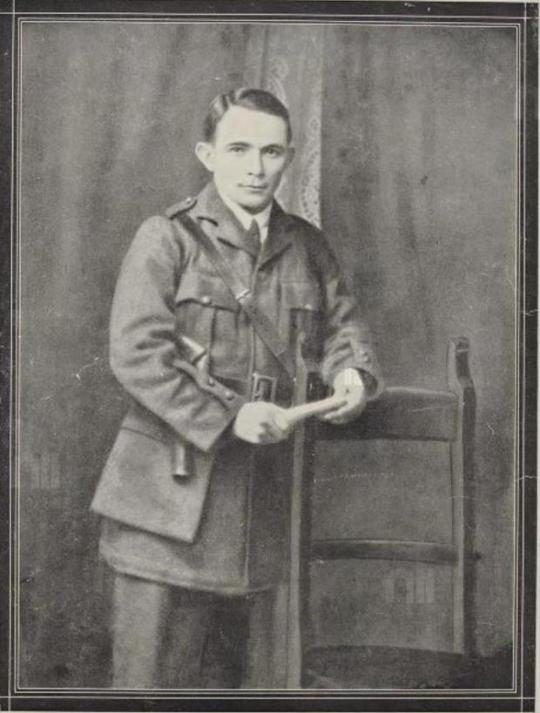
Con Colbert (died age 37)
In the weeks leading up to the Rising, he acted as bodyguard for Thomas Clarke. During Easter Week, he fought at Watkin's Brewery, Jameson's Distillery and Marrowbone Lane. They were marched to Richmond Barracks after surrender, where Colbert would later be court-martialled. Transferred to Kilmainham Gaol, he was told on Sunday May 7th he was to be shot the following morning. He wrote no fewer than ten letters during his time in prison. During this time in detention, he did not allow any visits from his family; writing to his sister, he said a visit "would grieve us both too much".
The night before his execution he sent for Mrs. Ó Murchadha who was also being held prisoner. He told her he was "proud to die for such a cause. I will be passing away at the dawning of the day." Holding his bible, he told her he was leaving it to his sister. He handed her three buttons from his volunteer uniform, telling her "They left me nothing else," before asking her when she heard the volleys of shots in the morning for Éamonn Ceannt, Michael Mallin and himself would she say a Hail Mary for the souls of the departed. The soldier who was guarding the prisoner began crying according to Mrs. Ó Murchadha, and recorded him saying "If only we could die such deaths."
Colbert was shot by firing squad the next morning on May 8th 1916.
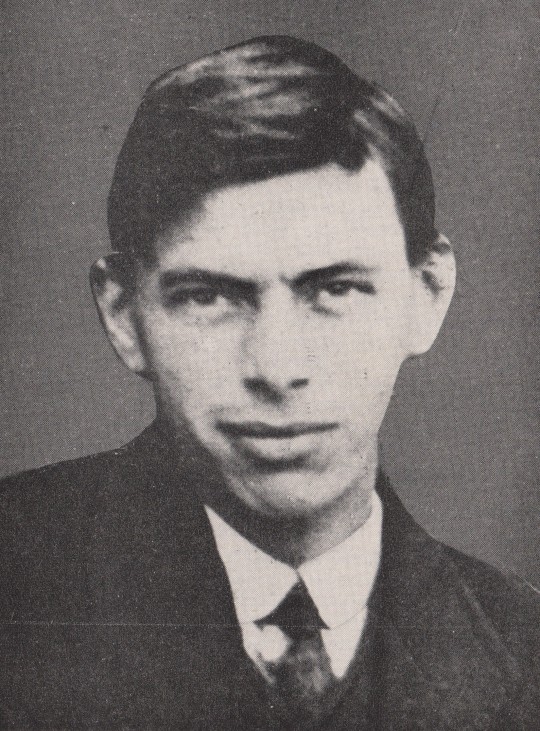
Sean Heuston (died age 25)
Heuston was the Officer Commanding of the Volunteers in the Mendicity Institution on the south side of Dublin city. Heuston was to hold this position for three or four hours, to delay the advance of British troops. This delay was necessary to give the headquarters staff time to prepare their defences. Heuston was arrested after the surrender and transferred to Richmond Barracks. O May 4th 1916, he was tried by court martial. May 7th 1916, the verdict of the court martial was communicated to him that he had been sentenced to death and was to be shot at dawn the following morning.
Prior to his execution he was attended by Father Albert in his final hours. Father Albert wrote an account of those hours up to and including the execution:
“…We were now told to be ready. I had a small cross in my hand, and though blindfolded, Seán bent his head and kissed the Crucifix; this was the last thing his lips touched in life. He then whispered to me: ‘Father, sure you won’t forget to anoint me?’ I had told him in his cell that I would anoint him when he was shot. We now proceeded towards the yard where the execution was to take place; my left arm was linked in his right, while the British soldier who had handcuffed and blindfolded him walked on his left. As we walked slowly along we repeated most of the prayers that we had been saying in the cell. On our way we passed a group of soldiers; these I afterwards learned were awaiting Commandant Mallin; who was following us. Having reached a second yard I saw there another group of military armed with rifles. Some of these were standing, and some sitting or kneeling. A soldier directed Seán and myself to a corner of the yard, a short distance from the outer wall of the prison. Here there was a box (seemingly a soap box) and Sean was told to sit down upon it. He was perfectly calm, and said with me for the last time: ‘My Jesus, mercy.’ I scarcely had moved away a few yards when a volley went off, and this noble soldier of Irish Freedom fell dead. I rushed over to anoint him; his whole face seemed transformed and lit up with a grandeur and brightness that I had never before noticed.”
Father Albert concluded:
“Never did I realise that men could fight so bravely, and die so beautifully, and so fearlessly as did the Heroes of Easter Week. On the morning of Sean Heuston's death I would have given the world to have been in his place, he died in such a noble and sacred cause, and went forth to meet his Divine Saviour with such grand Christian sentiments of trust, confidence and love.”
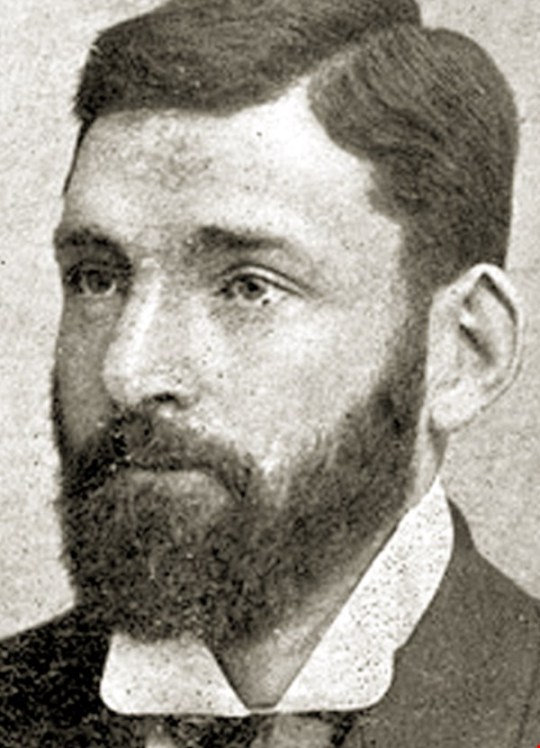
Thomas Kent (died age 50)
During the Easter Rising, the Kent residence was raided in a gunfight lasted for four hours. Eventually the Kents were forced to surrender. Thomas and William was tried by court martial on the charge of armed rebellion. His brother was acquitted, but Thomas was sentenced to death and executed by firing squad in Cork on May 9th 1916. He was buried in the grounds of Cork Prison.
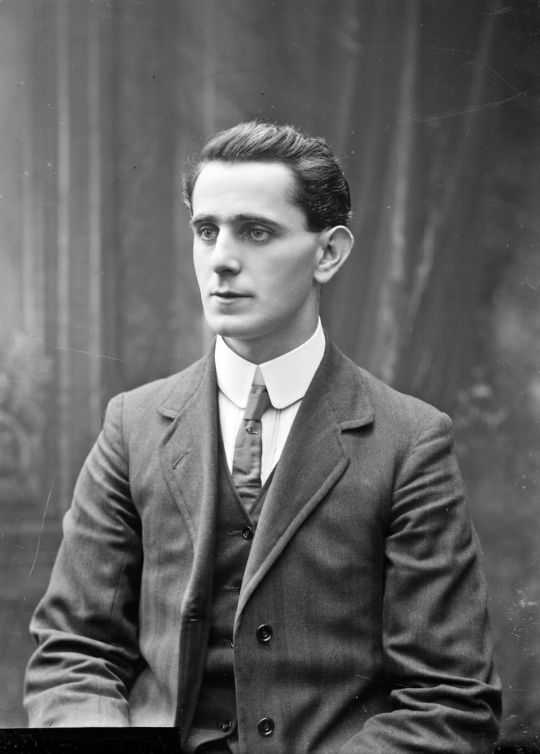
Sean Mac Diarmada (died age 33)
September 1915, he joined the secret Military Committee of the IRB. In 1914 he said:
"the Irish patriotic spirit will die forever unless a blood sacrifice is made in the next few years.”
Due to his disability, Mac Diarmada took little part in the fighting of Easter week, but was stationed at the headquarters in the General Post Office. Following the surrender, he nearly escaped execution by blending in with the large body of prisoners. He was eventually recognised by Daniel Hoey of G Division. Following a court-martial on May 9th, Mac Diarmada was executed by firing squad on May 12th. In his final letter he wrote:
"Miss Ryan, she who in all probability, had I lived, would have been my wife".
She and her sister, Phyllis also visited Kilmainham Gaol before his execution. Before his execution, Mac Diarmada wrote:
"I feel happiness the like of which I have never experienced. I die that the Irish nation might live!”
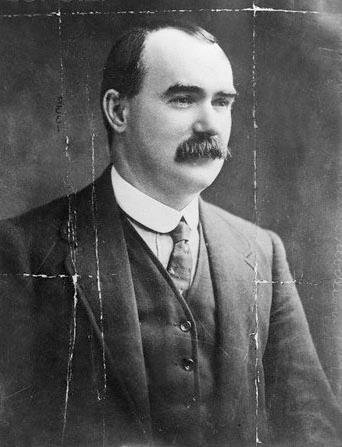
James Connolly (died age 47)
Connolly considered the rest of the leaders too bourgeois and unconcerned with Ireland's economic independence. During the Easter Rising, Connolly was Commandant of the Dublin Brigade and was de facto commander-in-chief. Following the surrender, he said to other prisoners:
"Don't worry. Those of us that signed the proclamation will be shot. But the rest of you will be set free."
Connolly was not held in gaol, but in a room at the State Apartments in Dublin Castle, which had been converted to a first-aid station for troops recovering from the war. Connolly was sentenced to death by firing squad for his part in the rising. On May 12th 1916 he was taken by military ambulance to Royal Hospital Kilmainham, across the road from Kilmainham Gaol, and from there taken to the gaol, where he was to be executed. Visited by his wife, and asking about public opinion, he commented:
"They will all forget that I am; an Irishman."
Connolly had been so badly injured from the fighting but the execution order was still given and he was unable to stand before the firing squad; he was carried to a prison courtyard on a stretcher. His absolution and last rites were administered by a Capuchin, Father Aloysius Travers. Asked to pray for the soldiers about to shoot him, he said:
"I will say a prayer for all men who do their duty according to their lights."
Instead of being marched to the same spot where the others had been executed, at the far end of the execution yard, he was tied to a chair and then shot. His body (with other leaders) was put in a mass grave without a coffin. The executions of the rebel leaders deeply angered the majority of the Irish population, most of whom had shown no support during the rebellion.
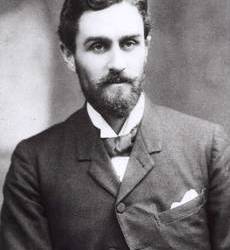
Sir Roger Casement (died age 51)
October 1914, Casement sailed for Germany via Norway. Casement spent most of his time in Germany seeking to recruit an Irish Brigade from among more than 2,000 Irish prisoners-of-war taken in the early months of the war and held in the prison camp of Limburg an der Lahn. His plan was that they would be trained to fight against Britain in the cause of Irish independence. Casement did not learn about the Easter Rising until after the plan was fully developed. The German weapons never landed in Ireland; the Royal Navy intercepted the ship transporting them.
Casement departed Germany in a submarine. In the early hours of April 21st 1916, three days before the rising began, the German submarine put Casement ashore. Suffering from a recurrence of the malaria, and too weak to travel, he was discovered at McKenna's Fort and arrested on charges of treason, sabotage and espionage against the Crown.
"He was taken to Brixton Prison to be placed under special observation for fear of an attempt of suicide. There was no staff at the Tower [of London] to guard suicidal cases."
At Casement's highly publicised trial for treason, the prosecution had trouble arguing its case. Casement's crimes had been carried out in Germany. During the trial, Casement’s personal diary detailed his homosexual encounters was uncovered. The British government circulated fake reports to portray Casement as a sexual deviant. Casement tried to appeal the violation of his human rights and against his conviction and death sentence. On the day of his execution, Casement was received into the Catholic Church at his request. He was attended by two Catholic priests. One said of Casement that he was:
"a saint… we should be praying to him [Casement] instead of for him".
Casement was hanged at Pentonville Prison in London on August 3rd 1916. His last word was “Ireland”.
#irish history#history#irish rebellion 1916#eastern rising#Francis Sheehy-Skeffington#thomas clarke#tom clarke#Patrick Pearse#Thomas MacDonagh#Joseph Mary Plunkett#Sir Roger Casement#joseph plunkett#roger casement#James Connolly#Sean Mac Diarmada#Thomas Kent#Sean Heuston#Con Colbert#Michael Mallin#Éamonn Ceannt#John MacBride#William Pearse#willie pearse#Edward daly#ned daly#Michael O’Hanrahan
515 notes
·
View notes
Photo
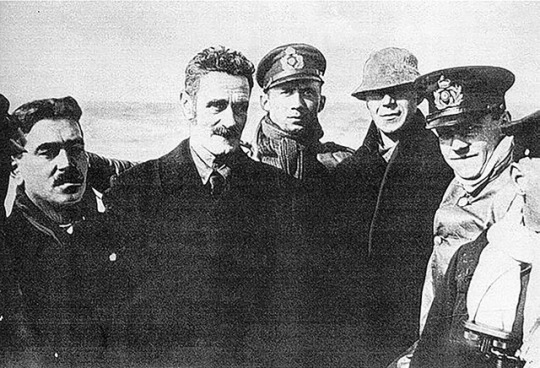
Robert Monteith with Roger Casement and Daniel Bailey on a German U-boat on their way to Ireland, April 1916. Shot soon before Casement’s arrest, subsequent trial and execution.
#pressles musing#irish history#irish rebellion 1916#history#ireland#roger casement#robert monteith#world war one
16 notes
·
View notes
Quote
I don’t want to go. If you’re taking me home to a nice quiet life, I’ll be satisfied to go. I’d love to go, but if you’re going home for a revolution, I’m likely to lose you and I don’t want to lose you.
Mrs Clarke to husband Tom Clarke before they moved from New York to Ireland. Mr. Clarke executed a few years later in 1916.
19 notes
·
View notes
Quote
Ireland.
Standing in the gallows of Britain’s Pentonville Prison, Roger Casement was asked by the governor if he had any final words. He had only one.
76 notes
·
View notes
Text
According to the journal of a British soldier who commanded the firing squads that executed Patrick Pearse, Thomas MacDonagh and Tom Clarke, Pearse was whistling as he came out of his cell:
“MAY 3rd . . . At 3:45 the first rebel [Thomas MacDonagh] was marched in blindfolded, and the firing party placed 10 paces distant. Death was instantaneous. The second, [Pádraig Pearse] whistled as he came out of the cell . . . The same applied to him. The third, [Tom Clarke], an old man, was not quite so fortunate, requiring a bullet from the officer to complete the ghastly business (it was sad to think that these three brave men who met their death so bravely should be fighting for a cause which proved so useless and had been the means of so much bloodshed).”
35 notes
·
View notes
Quote
It is a strange, strange fate, and now, as I stand face to face with death, I feel just as if they were going to kill a boy. For I feel like a boy — and my hands are so free from blood and my heart always so compassionate and pitiful that I cannot comprehend that anyone wants to hang me.
Roger Casement in a letter days before his execution.
32 notes
·
View notes
Quote
...if charity begins at home, empire begins in other men's homes.
Roger Casement, The trial of Sir Roger Casement
25 notes
·
View notes
Quote
Self government is our right, a thing born to us at birth a thing no more to be doled out to us by another people then the right to life itself then the right to feel the sun or smell the flowers or to love our kind.
Roger Casement
45 notes
·
View notes
Quote
Ireland that has wronged no man, that has injured no land, that has sought no dominion over others. Ireland is treated today among other nations of the world as if she was a convicted criminal. If it be treason to fight against such an unnatural fate as this, then I am proud to be a rebel and shall cling to my rebellion with the last drop of my blood.
Roger Casement
38 notes
·
View notes
Quote
Where all your rights become only an accumulated wrong; where men must beg with bated breath for leave to subsist in their own land, to think their own thoughts, to sing their own songs, to garner the fruit of their own labours - and even while they beg to see these things inexorably withdrawn from them - then surely it is a braver, a saner, and a truer thing to be a rebel in act and deed against such circumstances as this than tamely to accept it as the natural lot of men.
Sir Roger Casement's Speech Following his Conviction as a Traitor, 29 June 1916
16 notes
·
View notes
Quote
If there be no right of rebellion against a state of things that no savage tribe would endure without resistance, then am I sure that it is better for men to fight and die without right than to live in such a state of right as this.
Sir Roger Casement's Speech Following his Conviction as a Traitor, 29 June 1916
18 notes
·
View notes
Quote
If small nationalities were to be the pawns in this game of embattled giants, I saw no reason why Ireland should shed her blood in any cause but her own, and if that be treason beyond the seas I am not ashamed to avow it or to answer for it here with my life.
Sir Roger Casement's Speech Following his Conviction as a Traitor, 29 June 1916
15 notes
·
View notes
Quote
Loyalty is a sentiment, not a law. It rests on Love, not on restraint. The government of Ireland by England rests on restraint and not on law; and, since it demands no love, it can evoke no loyalty.
Sir Roger Casement's Speech Following his Conviction as a Traitor, June 29th 1916
20 notes
·
View notes
Quote
And if I die, as I think is fated, tomorrow morning, I shall die with my sins forgiven… If it be said I shed tears – remember tears come not from cowardice, but from sorrow.
Roger Casement’s last letter
#sob#roger casement#pressles musing#irish history#irish rebellion 1916#irish revolution 1916#easter rising
102 notes
·
View notes
Quote
I am on no hill, with no waves to see or hear far off. With no sea, but only the illimitable and no sea to gaze at. Death is not dark, but only deeper blue.
Roger Casement
35 notes
·
View notes
Quote
The other night I dreamed that you, Gee and I were at Murlough Bay, on the green hill, 900 feet above the sea coast to the McGarry’s house, looking out at the racing tides of Moyle. Churning currents and whirlpools, and overlapping tides, and Alba across the way, and the blue peaks of Jura clean and clear. The great panorama of island and hill and swirling waters that first made me realize what Ireland was to me… And now I am on no hill, with no waves to see or hear far off. With no sea, but only the illimitable and no sea to gaze at. Death is not dark, but only deeper blue.
Roger Casement, nine days before execution
48 notes
·
View notes